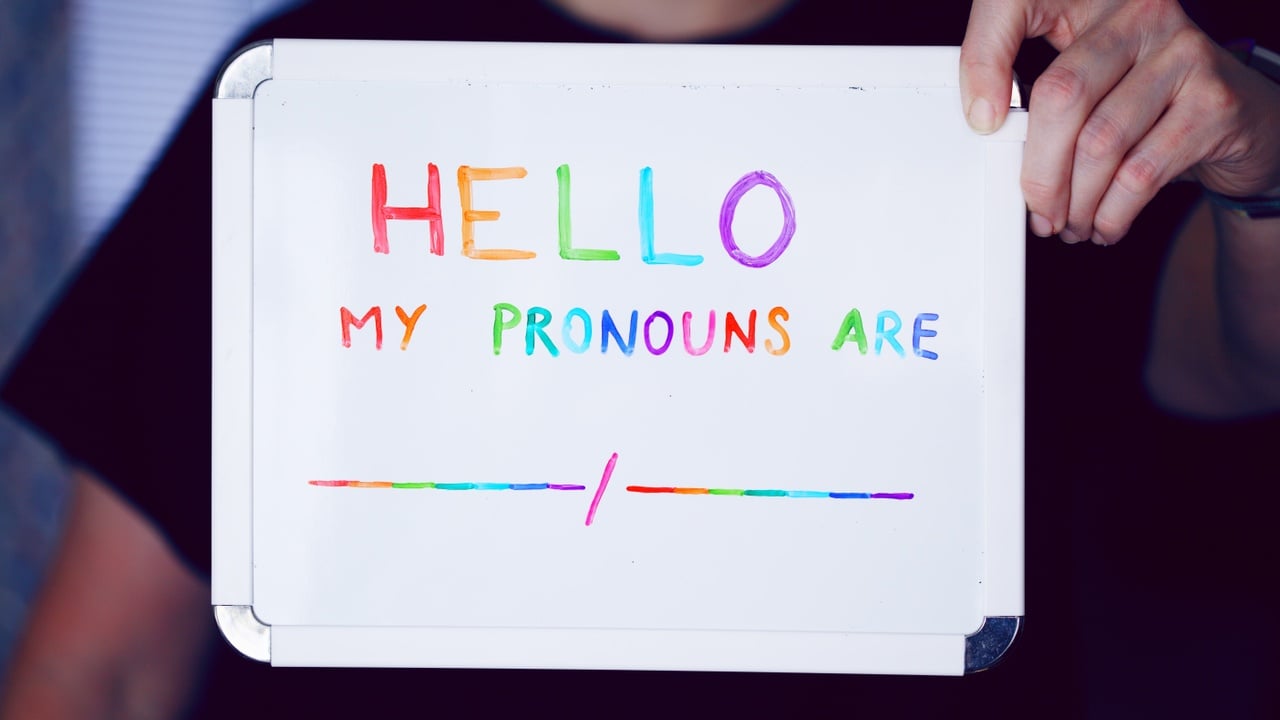Photo by Sharon McCutcheon
By Ali Smith
“Open-minded,” “liberal,” and “tree hugger” are labels I have always felt describe me, and words with which I’ve been proud to be associated. I do not recall ever making a conscious decision for acceptance to be a guiding value of mine; for as long as I can remember, I have always judged people on their actions and behaviors, not on their gender, race, sexual orientation, or gender identity. I have not placed a lot of importance on appearance (this is why I LOVE working in my pajamas from home – I just don’t care). Actions, behaviors, values, and kindness – this is what I care about and this is what I preach to my kids.
A relative of mine recently came out, which was not a surprise to anyone.
And then they announced their gender identity (label) as “non-binary”, and their pronouns as “he/they” (which was a surprise). I have tried very hard to change my reference to them, but I routinely revert to she/her, as this is how I have known them for the past 13 years. In fact, I made corrections while writing this post when referencing them. My love for them, and my opinion of them, has not changed. What has changed is my awareness and conscious effort to use inclusive language; to ensure they, and every single person in this world, feels accepted and is afforded the freedom to be who they are – not who the rest of the world assumes they are.
Remember all those labels – “liberal”, “open-minded”, “tree hugger”? As it turns out, what I didn’t know was how difficult it would be for me to make minor adjustments in my actions regarding labels - what labels actually do and how they impact people. I needed to teach myself inclusive language and integrate the practice. Using inclusive language and behaviors that promote an inclusive environment – with colleagues or family members - can have a positive and meaningful impact on your relationships – on my relationships.
At DJA, we define Inclusive language as communication that avoids using words, expressions, or assumptions that exclude people across gender, language, cultures, and identities. Inclusive language is not about being politically correct, it is a genuine effort to truly see and honor people in a way that is most appropriate for them (DeEtta Jones, Inclusive Manager’s Toolkit).
Pronouns are labels. “He” is a label. “She” is a label. “Ladies” and “gentlemen” are labels. This isn’t rocket science, right? These labels are not mean-spirited but they are limiting. They limit someone to an assigned or assumed gender identity - one that oftentimes, someone else provided. Adding a label to someone implies they must be the way I see them – something that makes it easy for ME to relate to, but may not be in line with the way they see themselves.
Instead of assuming you know the gender label someone prefers and risk alienating or excluding someone, try the following:
- When you introduce yourself include your pronouns. For example, at the beginning of a meeting with a new group say, “Hello, my name is Ali and my pronouns are she and her.” This gesture sends a clear and proactive message about your acknowledgment of diverse identities. It also creates a space for others to follow suit. That’s what allies do; they create space.
- If you are in a virtual meeting, in addition to your name, add your pronouns. You can invite others to add pronouns to their virtual spaces, too. Again, this models an inclusive practice.
- Ask! “What are your preferred pronouns?” If the person is taken back by this question or doesn’t have context, you can share from your own perspective. “I want to make sure I am not mislabeling or being presumptuous. I am asking if you prefer he/they/she/ze or something else? I, for example, use she and her. How about you? Use gender-neutral language. If you do not feel comfortable (yet) asking someone’s preferred pronouns, or if you are working with a group of people, using gender-neutral language will ensure everyone feels included, and more importantly, gender-neutral language is kind. For example, consistently use “they” in instances where you do not know a person’s preferred pronouns or you are speaking generally about a group.
Instead of: Hi guys!
Try: Hi Everyone/Everybody! Hello Friends! Good morning, Team!
Instead of: Ladies/Gentlemen
Try: Friends/Colleagues/Folks
Instead of: She/He/Ze/Ve
Try: They (unless you share a personal relationship with the individual and know their preferred pronouns)
Instead of: Her/His/Hir
Try: Their/Them
Instead of: Ze/Per/Hir/They
Try: Pronouns used in the trans community instead of “he/she” or “him/her.” These pronouns offer inclusion and accuracy for someone who doesn’t identify by the male/female gender classifications. Note: Not all trans people use these pronouns; many use “he” or “she.”
How I reference my relative means they can embrace who they are. It also means that I accept that my own actions and behaviors should, and can, make a positive impact and that I must continually learn and grow. With that, 2021 is my year of personal growth.
My new daily mantra: I will continue to be consciously aware of the effort I need to make to ensure others feel included and special. And yes, that means “Good morning all!” instead of my usual “Hey guys!” (Cringe).
What will you do to grow in 2021?

